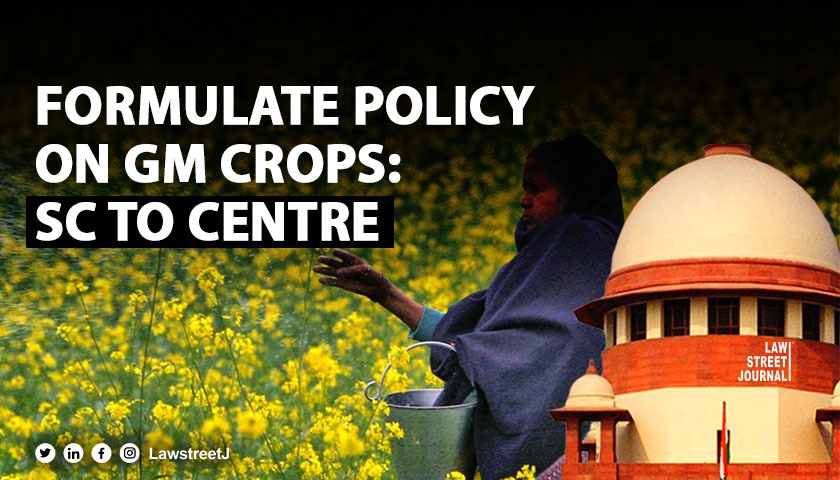NEW DELHI: In its split verdict on approval for environmental release of genetically modified (GM) mustard crop, the Supreme Court has on Tuesday directed the Centre to formulate a national policy with regard to GM crops for research, cultivation, trade and commerce in the country.
A bench of Justices B V Nagarathna and Sanjay Karol differed on the contentious decision of October 18, 2022, when the Genetic Engineering Appraisal Committee (GEAC) -- a statutory body under the Ministry of Environment, Forest and Climate Change (MoEF&CC) and regulator of genetically modified organisms in the country recommended the environmental release.
Another decision was taken on October 25, 2022 approving the environmental release of transgenic mustard hybrid DMH-11, a variety of GM mustard.
Acting on plea by NGO 'Gene Campaign' and others, the bench gave divergent opinions on the validity of the two decisions.
The court directed the matter to be listed before the Chief Justice of India DY Chandrachud for setting up an appropriate bench for adjudication of the controversy.
Having noted the difference of opinions on the decision of the GEAC and MoEF granting conditional approval for environmental release of DMH-11, the bench directed the registry to place the matter before the Chief Justice of India for constituting an appropriate bench to consider the said aspect afresh.
Also Read: Will we be ever able to De-Plastify our World?
In its 409-page judgment, the court, however, was unanimous in its finding that judicial review of both the October 18 and October 25 orders of GEAC is permissible.
The bench directed the Centre to evolve a national policy with regard to GM crops in the realm of research, cultivation, trade and commerce in the country.
"The said national policy shall be formulated in consultation with all stakeholders, such as experts in the field of agriculture, biotechnology, state governments, representatives of the farmers, etc," the bench directed.
The court said the MoEF&CC shall conduct a national consultation, preferably within the next four months, with the aim of formulating the national policy on GM crops. It felt the state governments should be involved in evolving the national policy on GM crops.
The bench further directed the Union government to ensure that all credentials and past records of any expert who participates in the decision-making process should be scrupulously verified and conflict of interest, if any, should be declared and suitably mitigated by ensuring representation to a wide range of interests.
The rules in this regard may be formulated having a statutory force, it said.
On the issue of importing of GM food and more particularly GM edible oil, the bench said the Centre shall comply with the requirements of Food Safety and Standards Act (FSSA), 2006, which deals with packaging and labelling of foods.
In her judgment, Justice Nagarathna termed October 18, 2022 and October 25, 2022 decisions as vitiated for being in gross violation of the principle of public trust.
The judge noted there was no representative of the Indian Council of Medical Research (ICMR), Ministry of Health in the meeting and the matter was not considered from the paradigm of the adverse effect on the health of human beings and animals as well as on other plants in the event of environmental release.
Justice Nagarathna said the failure to adequately assess the health and environmental impact of GM crops seriously infringes upon intergenerational equity as it potentially endangers the ability of future citizens to enjoy the highest attainable standard of health.
"Given the fact that the unanticipated consequences of the environmental release of DMH-11 remain in the sphere of uncertainty, I am impelled to construe the failure to undertake necessary measures in light of the TEC and the PSC (Parliamentary Standing Committee) recommendations and the non-compliance with directions of this Court as a violation of the right to a safe and healthy environment," she said.
The judge said the GEAC is duty-bound, both under domestic and international law, to sanction long-term chronic and intergenerational studies, as recommended by the TEC. However, the reluctance to conduct such studies would risk the health of future generations as well as the farmers’ right to conduct their agricultural activities most suitably, she said.
In his separate judgment, Justice Karol did not agree with the views of Justice Nagarathna and held that ban on GM crops is not warranted as it is a policy decision.
"The question of ban on HT (GM) crops is not warranted in view of the precautionary principle and it is a decision squarely within the domain of policy," he said in his separate 140-page verdict.
He held that the composition of the GEAC is in accordance with the rules and no fault can be found with the same.
"The conditional approval, leading to field trials for DMH-11 is in line with a developmental approach, of a scientific temper. The same has been supplemented with conditions imposed by the expert body, to facilitate mitigating measures qua the environment," Justice Karol wrote.
He said the field trials of DMH-11 shall continue in strict consonance with the conditions imposed and the Union of India and statutory authorities shall continue to strictly monitor the same.
The decision of the GEAC to grant conditional approval is not vitiated by non-application of mind, or any other principle of law, on the part of the body, which itself is an expert body, he said.
The judgment came on separate pleas were filed by activist Aruna Rodrigues and NGO 'Gene Campaign' seeking a moratorium on the release of any genetically modified organisms (GMOs) into the environment pending a comprehensive, transparent and rigorous biosafety protocol in the public domain conducted by independent expert bodies.
[Read Judgement]















